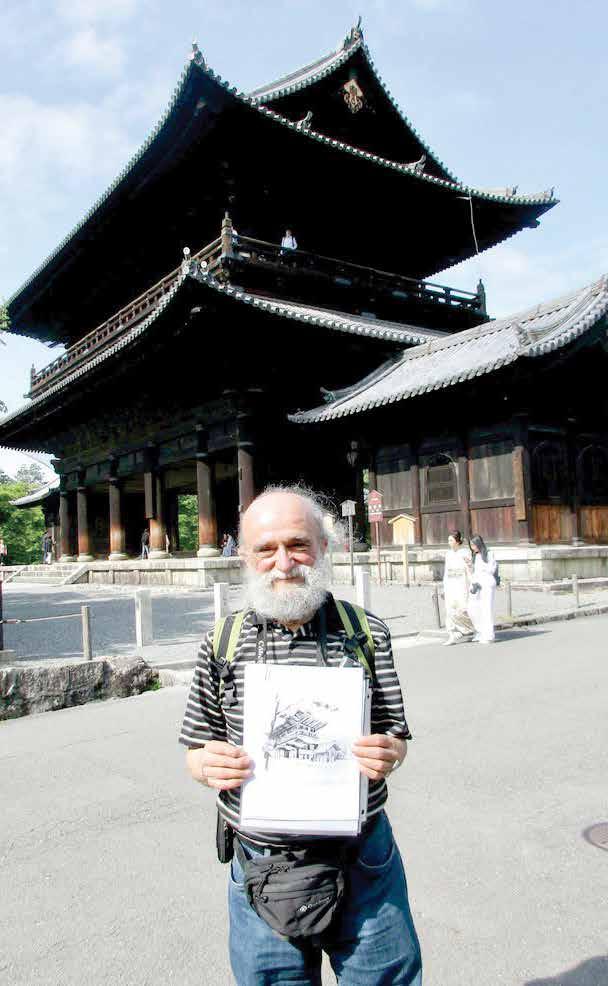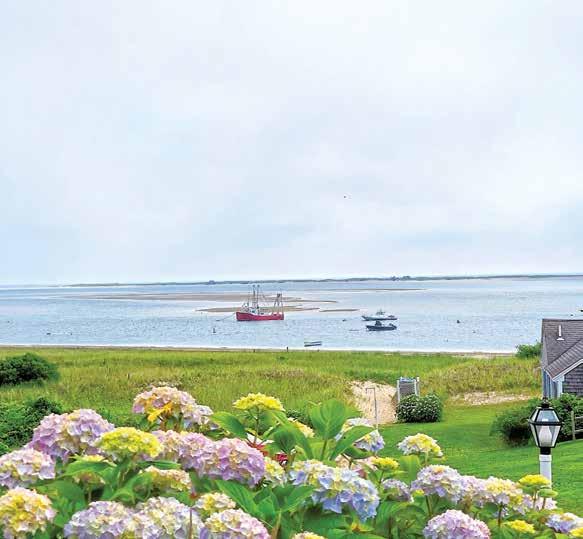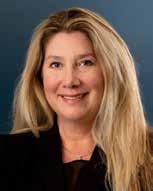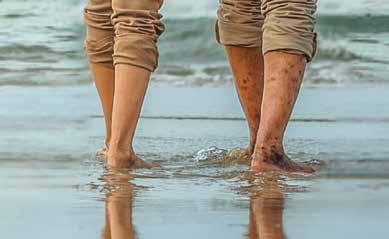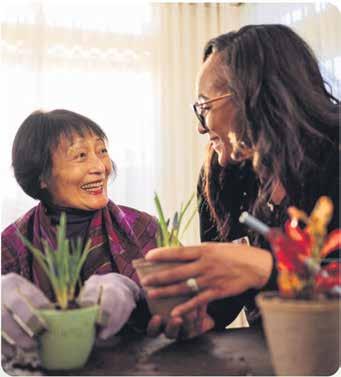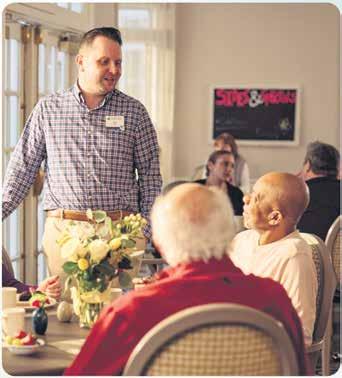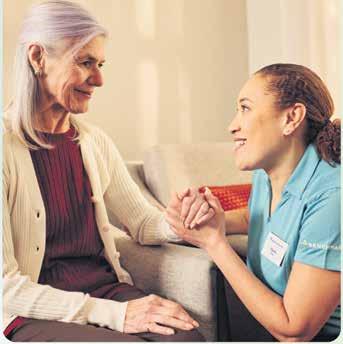thrive

UNEXPECTED ATHLETES
Staying active is a lifelong pursuit
MY FIRST TIME It’s never too late to begin again
LEGACY TRAVEL
Some journeys are an inheritance of experience


Staying active is a lifelong pursuit
MY FIRST TIME It’s never too late to begin again
LEGACY TRAVEL
Some journeys are an inheritance of experience
Meet the New Englanders who are embracing physical challenges and pursuing passion through sports, proving that strength only grows with time.
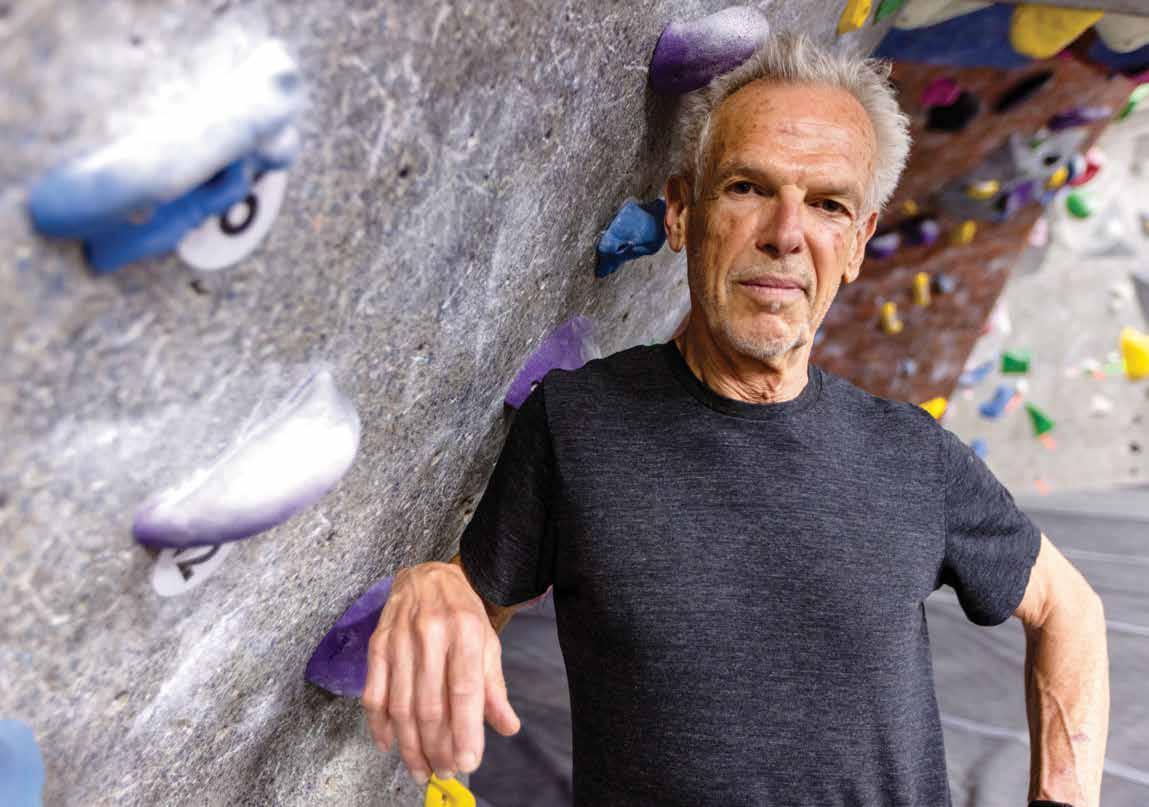
When Eduardo del Solar was a kid, competitive swimming gave him structure and discipline. A basic understanding of teamwork followed him through his life and helped not only his personal relationships, but his career as a teacher in Boston Public Schools.
Now retired at 73, the Boston resident has ditched the competitive edge for something more simple: enjoyment. His son recommended rock climbing as a new sport, and while del Solar was hesitant at first, he’s now hooked.
“I’ve never been a person who just sits around doing nothing,” del Solar says. “I also do dancing.” He hits the floor four or five times a week, but it’s the rock climbing that pushes his body to its limits. His goals and challenges have evolved as he’s aged, too.
Del Solar has been moving up the rankings at Rock Spot, the indoor rock climbing gym he frequents in South Boston. Climbers start at levels B1 through B10 — the “B” stands for beginner — and as their skills improve, they progress to V1 through V10.
“V10 is like Superman,” del Solar says. And while he’s already at V3, he’s not necessarily aiming for the highest spot.
“I’m happy going three times a week making absolutely sure I don’t injure myself,” he says. “Because then I can keep doing it through my 80s. My challenge is staying physically active.”
Injury prevention is a key part of that process. Del Solar is always thinking about how he can keep his body spry, active, and prepared for whatever may come. He stretches right when he wakes up in the morning and uses a standing desk to keep his spine straight. He’s overcome injuries before. Shin splints — a common bane of runners — and back spasms are obstacles, but del Solar is always looking for ways to flow with the challenges.
Del Solar is, according to himself, one of the oldest climbers at Rock Spot. The community there welcomed him with
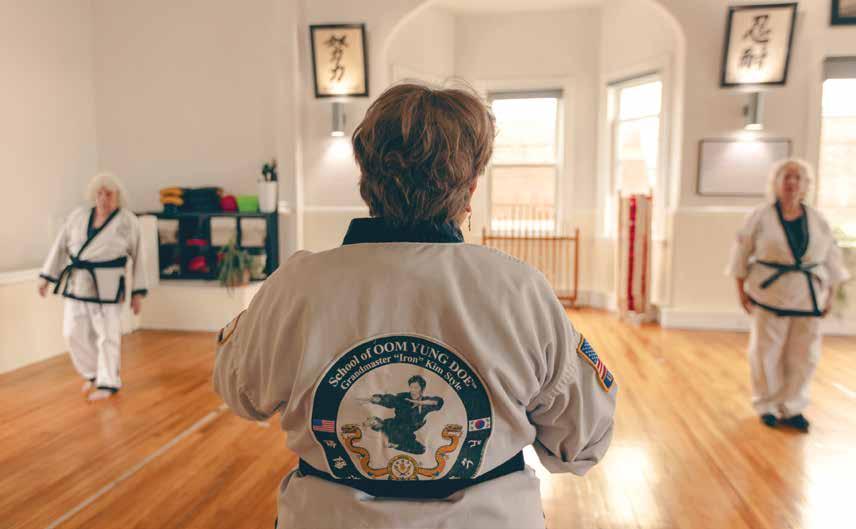
open arms, and those experiences have unlocked his mind to new ways he can age on his own terms.
“Physical activity is a form of liberation, provided that you engage in it in a smart way,” del Solar says. He credits his instructor, Omar Abo Sido, for guiding him through the learning curves of climbing, and now del Solar has found a new way to exercise the way he wants while fulfilling his goals. “The sport has given me a new life in the sense that the limitations I was having are gone,” he says.
Kicking expectations away
Phyllis Benjamin’s younger self would be shocked if she could see her now. The former book editor, singer, and literacy specialist has worn many hats throughout her life. But now, the 71-year-old resident of Cambridge has found a new calling. She’s a third-degree black belt at the New England School of Oom Yung Doe, practicing a Korean martial art that combines dynamic movement, self defense, and weapons training.
“I’m maybe the most conflict-adverse person in the world,” Benjamin says.
“I can’t even raise my voice at people.” She started not because she’s a “fighter,” but because her son insisted martial arts may hold the key to alleviating her back pain. She also has an essential tremor, a neurological disorder that causes involuntary, rhythmic shaking of the hands, arms, head, and other body parts. “The medication I took [for the tremor] had huge cognitive side effects and damaged my ability to work,” she says.
Benjamin turned to the mats, and in the last five years, she’s gone from pupil to instructor. It was a learning curve at first. She had rarely dabbled in athletics, let alone something as intensive as martial arts.
“I don’t think my younger self would understand how important it is to make this connection between your mind and your body,” Benjamin says, as her martial arts training has helped ease some of the symptoms from her tremor.
It’s natural to feel those hesitations, but it’s also good to try something that challenges you to learn new physical and mental skills.
Phyllis Benjamin
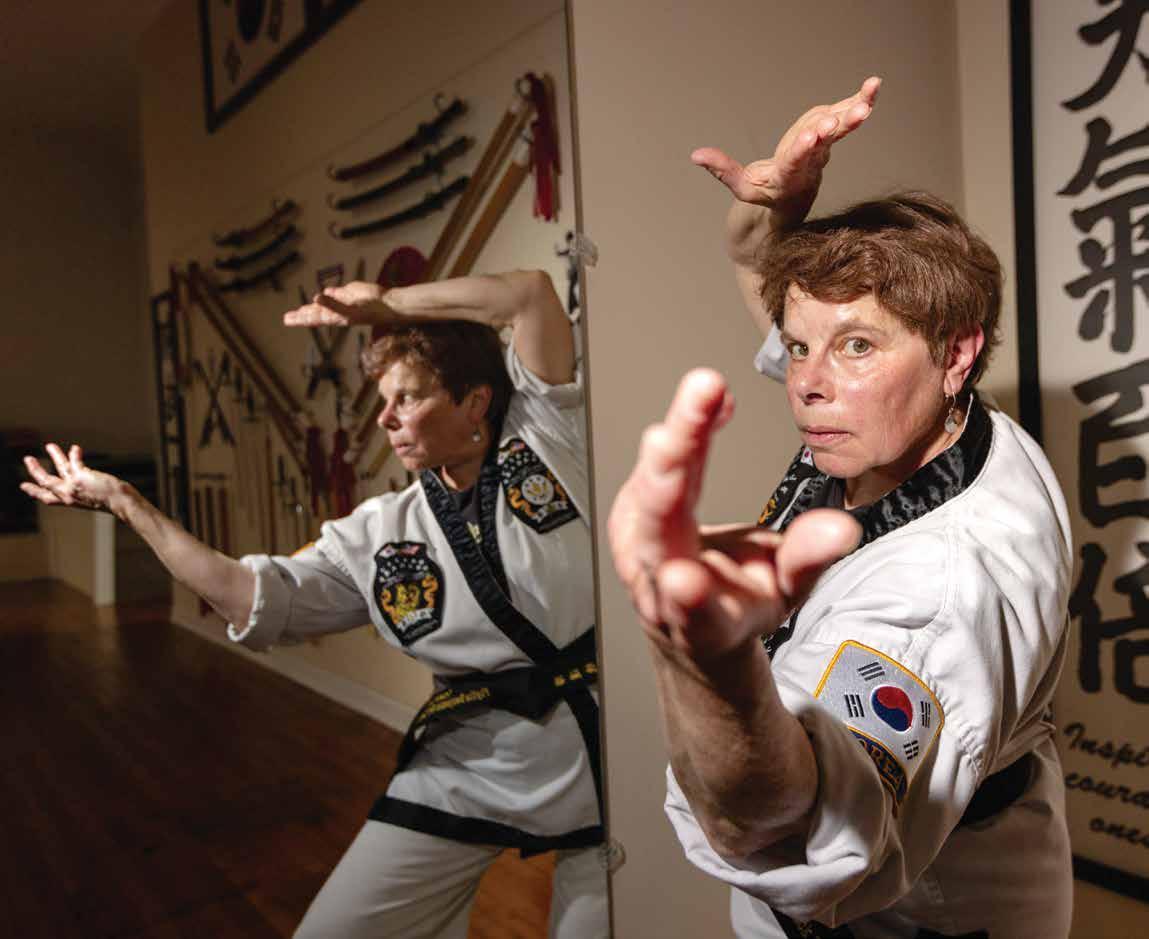
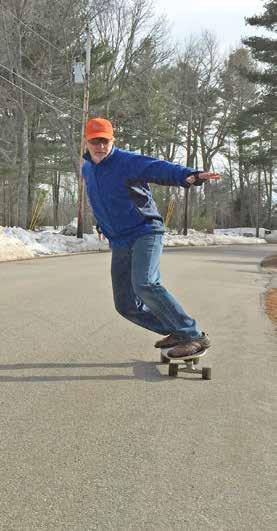
“It’s never too late,” Benjamin says about finding new ways to stay active and defy odds that come with aging. “You can always find something to do to engage your mind and body that’s going to improve your condition and outlook [on aging].
There’s a real joy in being able to share a skill, pass it on, and watch other people advance from a place that felt unskilled or troubled.”
Surfing away from the pain
Ted Heffernan is no stranger to athletics. The 70-year–old muscular therapist from Greenland, New Hampshire, jokes that it’d be easier to count the sports and activities he hasn’t participated in. But surfing, a newer activity for him, has become one of his favorites. He took up the sport at 58 after he was introduced to a shop owner down the Cape. He had tried riding the waves as a kid but never seriously pursued it.
“My biggest challenge was to be as good, if not better than I was as a kid,” Heffernan says. Getting into surfing forced him
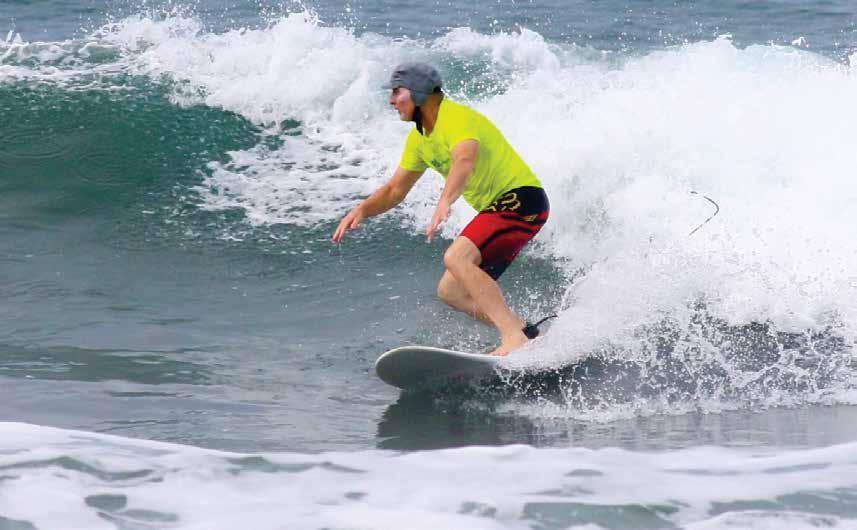
to use muscles he hadn’t used in a while, and managing a back injury didn’t make it easier. He’s long dealt with spondylisthesis, a condition where one vertebra in the spine slips out of place relative to the vertebra below it.
It was a gradual issue that built up over time, but Heffernan believes the surfing was a trigger that made it worse.
“I would feel the pain, and the intensity would depend on the length of the session,” Heffernan says. “How many times did I wipe out? Was it a gentle wipe out? Sometimes afterward it would be a little sore, but when I finally triggered it I was just bending over to pick something up.”
But Heffernan doesn’t think there’s any room for slowing down. Sleep and nutrition are key factors in staying ahead of injury management and keeping his body in shape. Hydrotherapy and 800 to 1,000 meters of swimming, often three to four times a week, help prep him for getting back to the waves quicker.
“As we get older, our bodies degenerate faster,” Heffernan says. “So in a sense, we can’t slow down. We have to actually do more.”
And in his line of work, he’s constantly helping retirees get their bodies back into comfortable shape. He’s practiced muscular therapy in Massachusetts and New Hampshire, and has seen many aging people get back into the activities they love.
Now, he’s going through the very trials he’s helped coach others through.
“The realistic way for us is to build a strategic plan,” Heffernan says. He emphasizes the importance of planning out individual steps, so that each one feels like an accomplishment in its own right.
“If the goal is to swim again, the first thing is to get back in the water. Incremental goals along the way keep the ego and emotional boosts moving.”
Beyond just aging
A study from the NIH found that athlet-
ics may have positive impacts on health outcomes in people over the age of 60.
Another concluded competitive sport can improve a person’s quality of life in terms of pain and discomfort, psychological wellbeing, and social relationships later in life.
Taking that first step can seem daunting, but the chance to find something truly new, engaging, and healthy doesn’t come around often. Opportunities lie in the challenges, and del Solar, Benjamin, and Heffernan have pushed the boundaries of what they thought they could do.
“It’s natural to feel those hesitations, but it’s also good to try something that challenges you to learn new physical and mental skills,” Benjamin says. “If you go out and only walk a block, challenge yourself to walk two blocks. Being able to set new challenges, and to start to meet them, is one of the things that helps us grow old, better.”
self-reinvention looks like for those who are willing to be curious and courageous.
After 36 years in the banking world, Dan Smith was ready for something new. At 60, newly retired and back in Massachusetts after a career that took him across the globe, he finally had the time — and the clarity — to learn how to fly.
“I’ve always been fascinated by both the art and the science of it,” Smith says. With pilots in the family, flying had long lived in the back of his mind. But he knew it was something that demanded full attention. “It’s time consuming. I couldn’t do it well while I was working.”
He waited. He retired. And then, slowly and deliberately, he began. His flight training stretched across nearly two years, involving more than 200 hours in the air, 400 takeoffs and landings, and the unwavering support of the instructors at the East Coast Aero Club. “You start by studying a lot,” he says. “Understanding the regulations, the science of why planes fly, the weather, what to do in emergencies.” It was a reintroduction to thick textbooks and sleep-inducing chapters. “It felt like being back in university and I don’t think I was that good at it back when I was going to college,” he laughs.
Flying helped fill the space that retirement opened. “It certainly became my job — in all the positive ways,” Smith says. “It reset my brain to learning new things, digging deep into details. At the end of my career I was acting pretty accurately on instinct…Taking up flying completely reset that.”
“It makes me think about other ways I can use my time in a more productive manner,” he adds. “Helped me realize I don’t know everything.” And despite everything he’s accomplished, Smith is clear-eyed about what the experience demanded of him. “It’s probably one of the hardest things I’ve done in my life,” he says.
His advice to others stepping into retirement: don’t default to what’s familiar. “Give a strong thought to trying something new and don’t just fall back on the hobbies you’ve had your whole life,” he says. “This being completely new for me really made a difference in resetting the next phase of my life as well as helping me move on from the last phase.”
A new chapter
Like Smith, Marv Alpert and Bruce Howell are no strangers to trying new things. At 79, Alpert, who lives in Waltham, Mass., has worn many hats over the years: special education teacher, business owner, day trader, digital artist. Based in Needham, Mass., Howell, 70, once worked in retail banking before losing his vision to an inherited retinal eye disease and eventually leading a web accessibility team at the Carroll Center for the Blind. Both had reinvented themselves more than once. But nothing prepared them for what came next — caring for their wives as Alzheimer’s slowly rewrote the shape of their days.
The pair met in a virtual support group for Alzheimer’s caregivers. “I was at home and he was at home, and being at home is pretty isolating,” says Alpert. “I thought ‘This guy seems about half way intelligent. Maybe I could talk to him,’” he jokes. What started as a conversation turned into a plan to co-write their book: Alzheimer’s Caregiving with Love, Laughter, and a Plan; and launch their
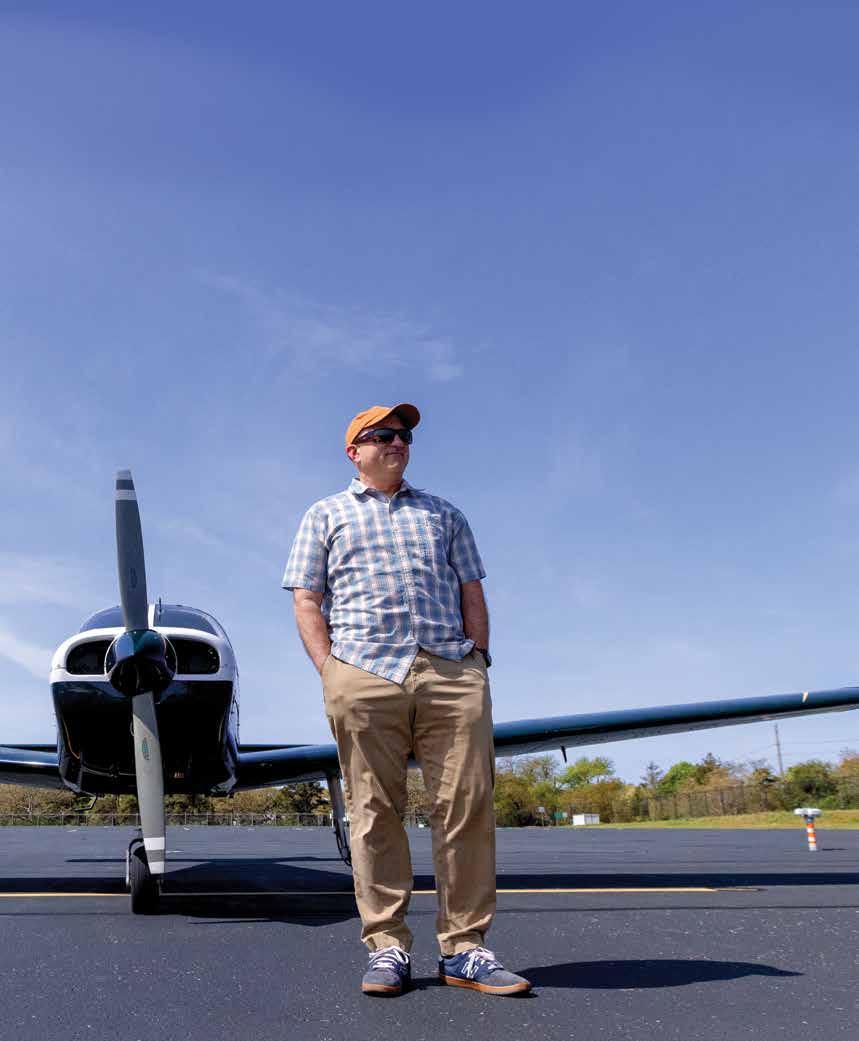
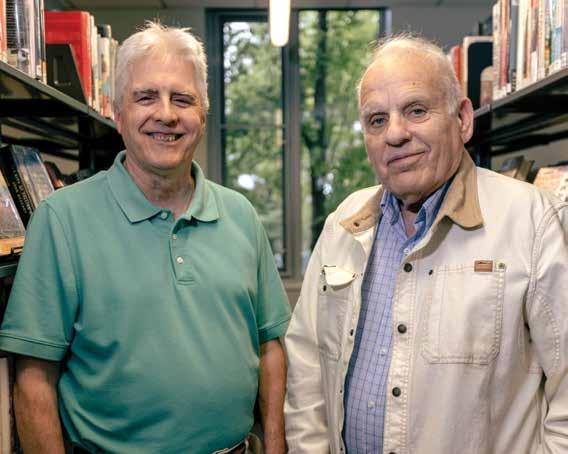
website, caregiversinfo.com — a hub of resources and support for those navigating the same journey.
Neither had written a book before. Neither knew how. But they also hadn’t known how to be caregivers — until they had to learn. “Before not knowing anything about writing a book, neither of us knew anything about caring for somebody with dementia or Alzheimer’s,” says Howell. “That was an entirely new experience. As it is for most people who find themselves in this role.”
Alpert didn’t let that stop him. “I really enjoy doing something I don’t know anything about. I mean if I knew what I know now, I’m not sure I would have written the book — it’s a lot of work.” But he never hesitated; “I was the opposite of scared. I
was excited to do something to stimulate my mind.” Howell agrees. “I think it’s so important for people as they age — maybe because we’ve seen what happens to a person with dementia — to keep our brains active, to try new things, to be exposed to new ideas, to interact with people,” he says. “All of these things are so important for our own mental health and wellbeing.”
That mindset carried over into how they approached their writing . They used AI to jumpstart the process, generating outlines, writing sections, editing — but ultimately rewrote most of what the tools gave them. Humor became their niche. “I think the thing that’s unique about the book is that we both have good senses of humor — at least, I do,” jokes Alpert. “It’s
very difficult to write a book, and then to write about this subject with a sense of humor,” he adds. “But I think that’s how both of us coped — finding laughter in it all.”
They both reject the label of “writer” and have little interest in turning a profit. The book, they’ll tell you, is for its readers: caregivers. “We felt that with the years of experience and gained knowledge that we’ve achieved, what a shame to not do something with that,” says Howell. “Making people understand that they’re not alone — there are a lot of other resources and other people experiencing the same kinds of challenges.”
As Howell well knows, the world isn’t stopping for anyone, and your age doesn’t mean you should either. “Life is too short
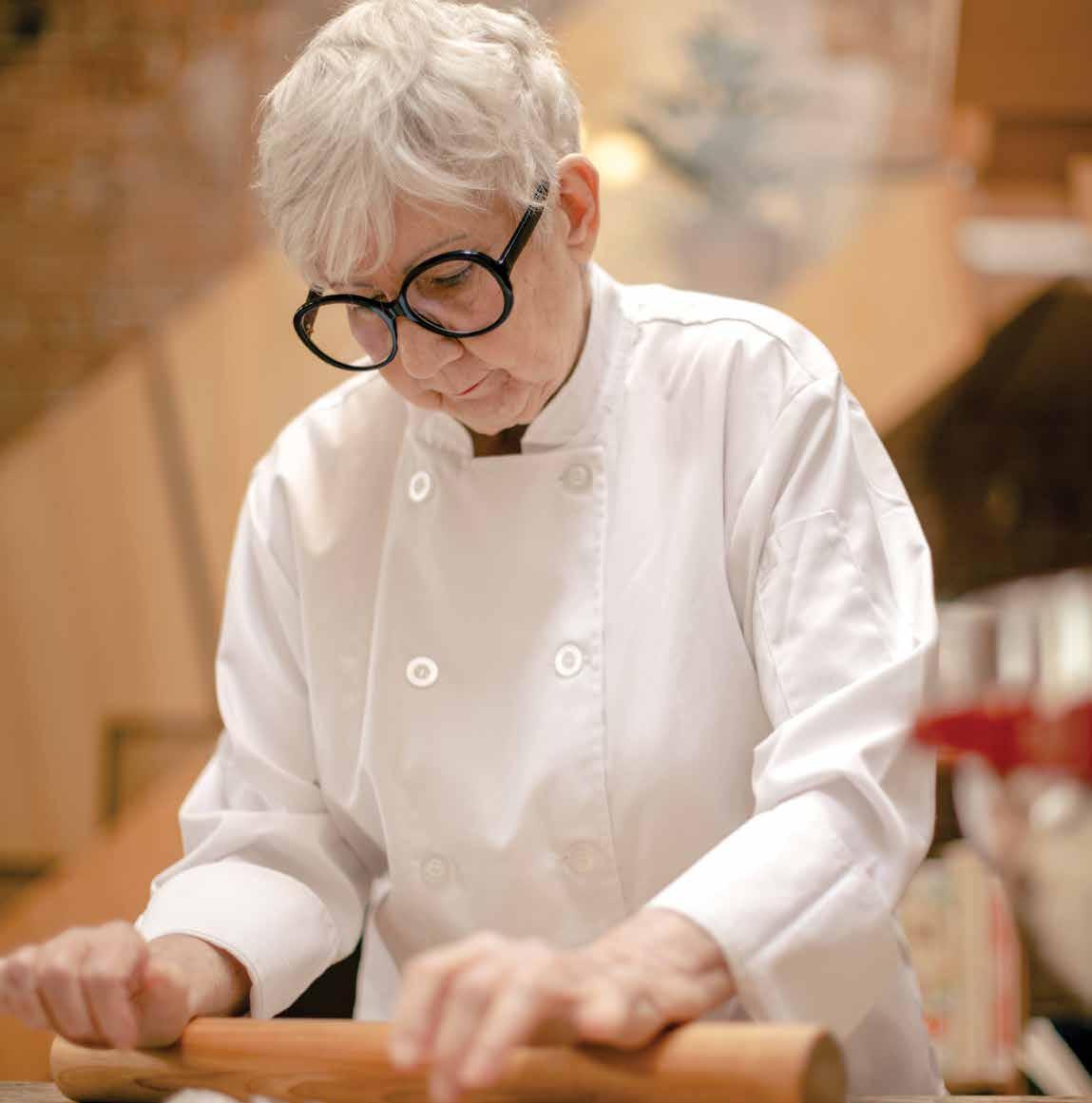
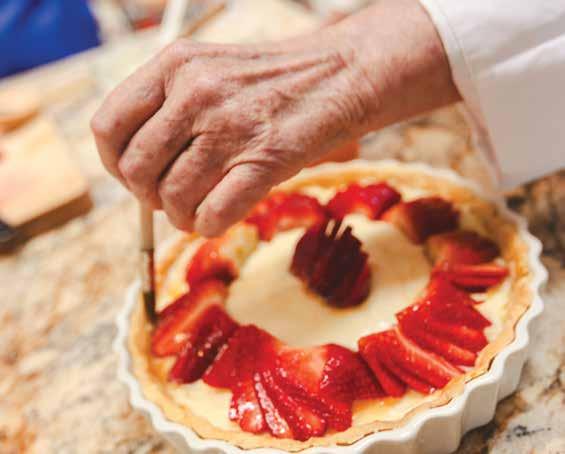
to not try something new and different and push yourself a little,” he tells us.
“Don’t be afraid to do it.”
skills,” she says. So she enrolled at the Cambridge School of Culinary Arts to earn her pastry certification.
“When you get older, you’ve done a lot of things,” Schichner laughs. “You’re not getting any younger, so you’re not getting the chance to go backwards and do something that you haven’t done that you would have liked to, so go forward and take advantage.”
That forward momentum has changed the way she sees herself at this stage. “My self-image changed,” she says. “Because you know what? It’s actually somebody I want to be at this time in my life. And to attain that — it’s a really good boost. I see myself differently.”
Schichner’s has no plans to slow down. “I wish I were going to be 300 years old because there’s so much I want to do,” she says. “There’s no time like the present. I mean, it sounds cliché, but it’s true.”
To begin again
” “Starting from scratch
You’re not getting any younger, so you’re not getting the chance to go backwards and do something that you haven’t done that you would have liked to, so go forward and take advantage.
Evelyn Schichner
Evelyn Schichner’s late-in-life leap began with a different passion — one that simmered quietly for years before finally coming to a boil. Originally from Santa Barbara, Calif., she’s spent decades in New England working as a web design administrator, raising a family, and refining her cooking skills. For over a decade, she flew to Paris to take cooking classes. The serious kind — Montmartre kitchens, the School Ritz-Escoffier. “That really upped my game,” Schichner says.
Three years ago, she started teaching at the Cambridge Center for Adult Education. That’s where she met Lilly, a sharp,
younger kitchen assistant who eventually became her business partner. After years of teaching, Schichner decided it was time. “I wanted to move on,” she says. “I wanted to finally do my ultimate dream, which was to have my own French cooking school.”
Now, at 79, she co-runs Joie en Cuisine, a boutique French pastry school in Boston offering intimate, technique-driven classes. Students leave with aprons, pastry boxes, and the kind of one-on-one instruction Schichner always wished she’d found locally.
Even with all the moving parts that come with starting a business from scratch, Schichner is still betting on herself. It’s not aging that concerns her — it’s becoming stale. “I want to sharpen my
There’s something quietly radical about doing something new when the world tells you to slow down. About putting your hands on the yoke of a small plane, self-publishing your first book, or opening the business you’ve dreamed about for decades.
They’ve done it, take it from them.
“You don’t just stop because you become a certain age,” Schichner says.
Or the way Howell puts it: “The only way that you can feel alive is figuring out positive things to do in your life.”
And Smith, more quietly: “It’s energizing to find people with a passion. It resets you.”
Maybe that’s the point — to begin again, not despite your age, but because of it.
From Sicily to Japan, these travelers are walking in the footsteps of their ancestors
There are plenty of reasons one might travel later in life: the accumulation of savings, children having moved out, retirement, pure pleasure, a thirst for adventure, language learning, the list goes on. But on top of all the leisure-based rationales, there is also the matter of heritage — returning to one’s homeland, tracing in a family member’s footsteps, and journeying to protect or prolong a certain legacy. It’s travel with purpose. And right now, there’s a generation of folks redefining the impact of traveling later in life in pursuit of meaning and history.
Here’s a look at some inspiring, New England born-and-bred folks exemplifying the movement. Perhaps they’ll inspire you to do the same:
A passport to the past
Bob Brady is what he calls “OFD” (originally from Dorchester). While the extent of his overseas travel pre-retirement consisted of a year-long stint outside of Istanbul while stationed in the coast guard during the Vietnam war, it wasn’t until after he retired that he properly began to travel. Now, at the age of 78, he’s been to more than 70 countries and is showing no signs of slowing down. This year, he plans to hit Austria, Thailand, and the Philippines, among other places).
As he puts it, each destination has had its distinct merits. Many of his journeys are oriented towards legacy or heritage-based travel, but few have had as resounding an impact as his trip to Japan in 2023. “Japan had been on my bucket list for quite some time,” says Brady. “But going with a purpose — in pursuit of retracing my father’s footsteps — made the journey that much richer.” Brady’s father was stationed in Japan in World War II. He passed away when Brady was young — and when he was diagnosed with pancreatic cancer in his 60s, he quickly lost lucidity, thus denying Brady access to some of the stories or totems of personal history that he craved. Fortunately, his mother found a series of personal effects he’d stowed away when he was honorably discharged for Brady to hold onto. Among them was a series of vintage postcards depicting the parts of Japan his father had visited when he worked in the coast guard. “I regret that we never got to discuss his wartime adventures, adult to adult,” says Brady. “But blissfully, he was part of a generation that kept meticulous records — notes, menus, matchbooks, post cards.”
Post-retirement, Brady has done much of his travel with Overseas Adventure Travel (OAT), a travel agency that curates immersive group and solo trips abroad. When he registered for a Japan excursion, he determined that he’d do everything he could to visit each of the sites depicted in his father’s photographs and recreate them himself.
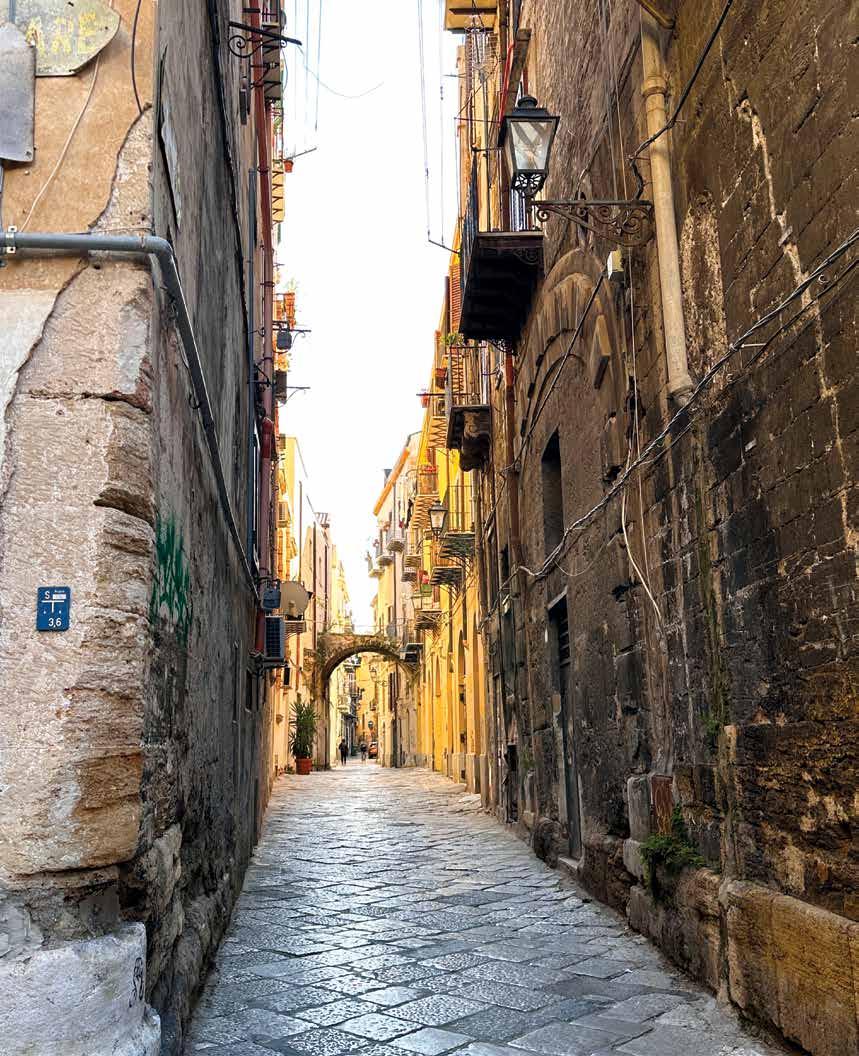

Upon mentioning his “extracurricular project” to the trip’s leader, the whole tour group expressed enthusiasm in helping Brady photograph the sites included on his itinerary — even devoting free time to visiting sites not included in the trip’s original planning. These included the Kiyomizudera Temple, the Togetsukyo Bridge by the shore of the Katsura River, and the Nanzenji Temple. “When I left, I not only had all these photos of the places my father had been, but I had photos of myself there, too,” says Brady. “And I felt as if I’d had this opportunity to really walk through my father’s footsteps. That he was really watching me from wherever he is now, appreciating.”
Now, the documents he’s created — living homages to his father’s war history
— rest amongst the archive he’s built during his travels. He hopes these artifacts will someday be passed down to his family: his own folio of retraceable relics that are a testament to life lived, adventures had, oceans crossed. “Sure, there are local places I still need to visit,” says Brady. “But while I’m still well enough to get on an airplane, I’m going to make it absolutely everywhere I can.”
A return to her roots
For Massachusetts-born Debra Anderson, extended travel in Sicily had long been a dream. Born in Somerville, she raised her family in Massachusetts, working as an army scientist in Natick before retiring in 2023. Earlier this year, at the age of 68, with her children settled and out of the house, she found herself
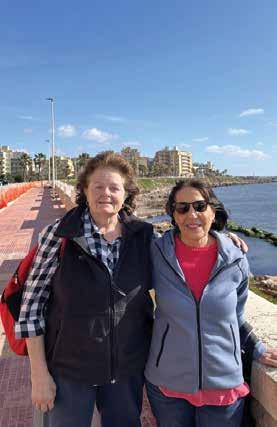
faced with just the Italian opportunity she’d been looking for: a month in Sicily, designed to allow her to live like a local. The trip was guided by The Good Life Abroad, an agency that curates experiences in cities across Europe on a month-by-month basis. “Of course, no one really thinks you’re a local. People can tell you’re American from a mile away,” she says. “But spending a full month getting to know your surroundings in one place is just about as close as you can get as a traveler.”
Anderson’s family on her late mother’s side is Italian, going back generations, and she’d been eager to find an opportunity to return and explore the land of her heritage. But rather than go for a quick-hit trip, she felt that taking her
I’d always wanted to go. But more so, to spend time exploring this part of my history, and my mother’s history with my aunt. I was so gratified I could give that to her.
” “
Debra Anderson
time immersing herself in the local culture would be that much more rewarding.
“Being there for a while gave me some time to really think about where my family’s from, Messina, and acclimate to the culture,” she explains.
As the icing on the cake, Anderson’s aunt — her mother’s sister, who is 100 percent Sicilian and lives in Arlington, Mass. — was equally eager to get back to her roots. “One of my biggest goals of this experience was to bring [my aunt] to the place where she came from,” she says. “So we rented a car and drove across Sicily, all the way to Messina.”
Arriving in the beach town of Messina in February, the place was quiet — in a good way. “We had all this time to walk on the beach and talk,” she says. “And she collected all of this seaglass to bring back to her grandson, so he’d have a token of his heritage.”
For Anderson, this was special: Her aunt is in her late seventies, and, if not now, she was unsure whether she’d be able to orchestrate a trip like this for the two of them again. Blissfully, all went according to plan. While the pair hadn’t done extensive genealogy research, Anderson shared her mother’s maiden name with several locals, who confirmed that the name was familiar.
“My aunt has been one of my biggest inspirations in life, so taking her on this trip just felt like a big ‘thank you,’” she
says. “I was so glad I could do that for her.”
Once the two had returned to Palermo, where Anderson was residing for the month, they realized their apartment was down the street from a café called Rosie’s Café — a family name. “It was just something written in the stars, you know?” she says. “Rose was my grandmother’s name, my great-grandmother’s name. It’s my dog’s name, it’s part of my name … so we made a point to go every day.”
As she puts it, the place was nothing remarkable: a charming, local hole-inthe-wall espresso bar. But the pair fell in love with the daily ritual, coming by each morning for espresso and cannoli. And even without language prowess, the staff came to know them, preparing their regular orders with joy and aplomb. “It’s the only time in my life I’m sure I’ll have cannoli every day for breakfast,” she jokes.
“So we’d go every morning. Then we’d walk and travel all day, and we’d stop every night on the way back to have a beer or a glass of wine. It became so sacred.”
At the end of a month, it can be hard to leave anywhere behind — especially Sicily — but Anderson says she got what she needed out of the trip. “It was one big check mark for me,” she explains. “I’d always wanted to go. But more so, to spend time exploring this part of my history, and my mother’s history with my aunt. I was so gratified I could give that to her.”
